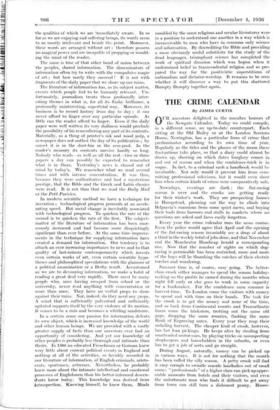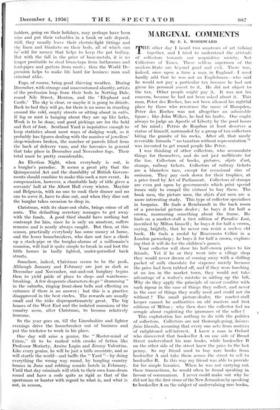THE CRIME CALENDAR
By JAMES CURTIS
Nowadays, evenings are dark : the flat-racing season is over and the crooks are getting ready for their winter's work. They are prospecting houses, in Hampstead, planning out the way to climb into Belgravia's mansions from some quiet mews, and buying their tools from barrows and stalls in markets where no questions are asked and faces easily forgotten.
Every year the crime calendar runs the same course. Even the police would agree that April and the opening of the flat-racing season invariably see a drop of about a third in the weekly total of jobs done, and that November and the Manchester Handicap herald a corresponding rise. Now that the number of nights on which dog- racing is permissible has been restricted, more and more of the boys will be thumbing the catches of their electric torches and wondering.
Summer time is, of course, easy going. The better- class crook either manages to spend the season holiday- making on the profits he earned during the months when night fell early or else goes to work in some capacity for a bookmaker. For the confidence man summer is harvest-time. To London come the visitors with money to spend and with time on their hands. The task for the crook is to get the money and none of the time, and so back from Continental resorts and Transatlantic liners come the tricksters, trotting out the same old gags, dropping the same rosaries, flashing the same Bank of Engraving notes. Every year they reap their unfailing harvest. The cheaper kind of crook, however, has but lean pickings. He keeps alive by stealing from unattended motor-cars, by playing tricks on-unsuspecting shopkeepers and householders in the suburbs, or even has to get a job of sorts and go straight • During August, naturally, money can be picked up in various ways. It is not for nothing that the month has been called the silly season. A -petty crook will find it easy enough to swindle seaside landladies out of small sums : " professionals " of a higher class can pick up appre- ciable amounts from hotels and their visitors, and even the unfortunate man who finds it difficult to get away • from town can still turn a dishonest penny. House- holders, going on their holidays, may perhaps have been wise and put their valuables in a bank or safe deposit. Still, they usually leave their electric-light fittings and the linen and blankets on their beds, all of which can be- sold for money that helps to keep the pot boiling. But with the fall in the price of base-metals, it is no longer profitable to steal brass-taps from bathrooms and lead-pipes and gutters from roofs ; thus the World De- pression helps to make life hard for busines3 man and criminal alike.
Fogs, of course, bring good thieving weather. During December, with strange and unaccustomed alacrity, artists of the profession leap from their beds in Notting Dale, round Nile Street, Hoxton, and the ' Elephant and Castle.' The sky is clear, or maybe it is going to drizzle. Back to bed they will go, for there is no sense in standing around the cold, empty streets or sitting about in cafes. If fog or mist is hanging about they are up like larks. Work is to be done, and good pickings are for the bold and fleet of foot. Scotland Yard is inquisitive enough to keep statistics about most ways of dodging work, so it probably has figures dealing with the number of jewellers' shop-windows broken, the number of parcels lifted from the back of delivery vans, and the larcenies in general that take place in December and November fogs. Their total must be pretty considerable.
An Election Night, when everybody is out, is a burglar's paradise. It seems a great pity that the Quinquennial Act and to durability of British Govern- ments should combine to make this such a rare event. In compensation, however, a charitable lady of title gives a servants' ball at the Albert Hall every winter. Mayfair and Belgravia, with no one to cook their dinner and no one to serve it, have to dine out, and when they dine out the burglar takes occasion to drop in.
Christmas, with its share-out clubs, brings crime of all sorts. The defaulting secretary manages to get away with the funds. A good thief should have nothing but contempt for him, since he is only an amateur, suffers remorse and is nearly always caught. But then, at this season, practically everybody has some money at home, and the lesser housebreakers, who dare not face a climb up a stack-pipe or the burglar-alarms of a millionaire's mansion, will find it quite simple to break in and loot the little homes in badly lighted, under-patrolled back streets.
Somehow, indeed, Christmas seems to be the peak. Although January and February are just as dark as December and November, out-and-out burglary begins then to yield pride of place to shop- and warehouse- breaking. A few desperate characters do go " drumming" in the suburbs, ringing front-door bells and effecting an entrance if there is no answer ; but this is a practice disapproved in the best circles. The rewards are usually small and the risks disproportionately great. The big houses of the West End and the isolated mansions of the country seem, after Christmas, to become relatively immune.
So the year goes on, till the Lincolnshire and lighter evenings drive the housebreaker out of business and put the trickster to work in his place.
One day will arise a genius, the " Master-mind of Crime," fit to be ranked with crooks of fiction like Professor Moriarty, Arsene Lupin and Jimmy Valentine. Like every genius, he will be just a trifle eccentric, and so will startle the world—and baffle the " Yard "—by doing everything the wrong way. round, by burgling country houses in June and robbing seaside hotels in February. Until that day criminals will stick to their own hum-drum round and have a code quite as rigid as that of the sportsman or hunter with regard to what is, and what is not, in seasons





















































 Previous page
Previous page